- Home
- Tim LaHaye
The Regime: Evil Advances / Before They Were Left Behind Page 5
The Regime: Evil Advances / Before They Were Left Behind Read online
Page 5
“Not at peace then.”
“Not at all.”
Carpathia walked Planchette onto a balcony over his veranda. The wind whipped through a cloudless sky, and the sun highlighted the mountain peaks on the horizon.
“I never asked how you took care of my fathers, Reiche.”
“It was prudent that you did not. It was one of the most distasteful assignments I ever had, and I don’t wish to revisit it.”
“I need you again, Reiche.”
“Please, no. Emil Tismaneanu has extensive security, not unlike yourself.”
“I will defeat Emil politically. But an example needs to be made of Ion.”
“Ion? Surely you can’t be serious.”
“Think, man. I can live with disloyalty to a certain degree. A man wants to move on, finds a better deal, does not want to face me, all right. That proves he is independent, has his own mind. Maybe someday I hire him back. But if you think that is the extent of what Ion did to me, you are a prostovan with such naivitate that I must question your intelligence. Ion is a traitor, Reiche. If I were to let him get away with costing me a hundred-million-dollar deal, my reputation would be worthless. I would be seen as a weakling, easily trampled upon.”
“And yet if something happens to Ion, you will become the immediate suspect.”
“I was not suspected in the deaths of my fathers.”
“You were just past childhood, and that was a very expensive, very professional job. And, as I say, one I do not wish to revisit.”
“We are revisiting it, Reiche. Ion will be dealt with in such a way that it will be clearly an accident. No one will even suspect me. You will make it happen.”
Reiche moved away, staring into the distance. “If it is done so well, how will that protect your reputation? A man who has seemingly done you wrong is befallen by an unfortunate accident. It will be seen as a coincidence, karma at best.”
“Those who need to know will know. Or at least they will wonder. This might even discourage Emil from running against me.”
Irene could not have been more stunned if her mother-in-law had told her she had been a contortionist in a former life. After a couple of typical episodes of forgetting where she was or which way to turn to get back to her room, she asked what time lunch was.
“We just came from there, Mom,” Irene said. “You enjoyed the coleslaw, remember?”
“Oh yes! That was today?”
It had been ten minutes before.
“Mom, do you ever pray?”
“Why, yes, of course I do. I pray every day. I am a Christian, you know.”
I know you think you are, Irene wanted to say. But the woman was fragile.
“I worry so about my husband. I don’t think he really knows the Lord.”
“You don’t?” Irene said.
“Not like I do, no. My son either.”
“How so?”
“You have to have Jesus in your heart,” she said, sounding so much like a little girl that Irene was taken aback.
“And how do you get Jesus in your heart?”
“Not physically, you know,” the old woman said. “It’s just an expression.”
“I understand.”
“I found it in the Bible. Our church never talked about it. That we’re all sinners and separated from God. That Jesus died for our sins. I mean, we heard that a lot, but it seemed to refer to the whole world. He did die for the whole world, but you have to receive Him for yourself. I have a favorite verse.”
“You do?”
“Oh, what’s the reference again?”
“I don’t know, Mom. What is it?”
“I like when you call me Mom. I’m not your mother, am I?”
“You’re my mother-in-law.”
“You’re Rayford’s wife. I was at your wedding.”
“You sure were.”
“When are you going to give us grandchildren?”
Irene pulled out pictures and reminded her of Chloe and Raymie.
“Of course, I remember.”
“And your favorite verse? What is it?”
“I can’t remember the address.”
Irene had never heard that term for a Bible reference. “Just tell me the words then.”
“ ‘As many as received Him, to them He gave the right to become children of God, to those who believe in His name.’ I believe in His name, Chloe.”
“I’m Irene.”
“I believe in His name, Irene.”
Irene could barely speak. What a gift this was!
“Everybody stops after Romans 3:23,” Mrs. Steele said, astonishing Irene anew.
“So that address you remember.”
The old woman nodded. “They need to read the next verse too.”
“Do you remember it?”
“Of course. Both of them. ‘For all have sinned and fall short of the glory of God.’ But here’s the best part: ‘being justified freely by His grace through the redemption that is in Christ Jesus.’ ”
“That is beautiful, Mom.”
“Yes, it is. John 1:12.”
“Beg pardon?”
“That’s the address of the first one, Chloe.”
“Irene.”
“Irene.”
SEVEN
ION WAS KILLED in rural Moldova when his brakes failed and he plowed into first a gas truck and then a horse-drawn wagon.
Nicolae attended the funeral, sent a lavish spray of flowers, and attempted to console the grieving widow, who clearly wanted nothing to do with him. He thawed her by whispering that he was establishing a fund for their only child, a sixteen-year-old son, so his college expenses would be covered. She reached to embrace him, and over her shoulder, Nicolae caught Emil Tismaneanu’s eye.
Tismaneanu was more than twice Carpathia’s age and dressed and comported himself like the successful businessman and politician he was. Nicolae excused himself from the widow and made his way to Tismaneanu for an awkward handshake.
“Thanks so much for informing me before raiding my ranks,” Nicolae whispered.
“Raiding?” Tismaneanu said softly with a smile. “It’s not like I stole one of your cabinet. I wouldn’t do that to you without your knowledge. As quickly as Ion was available, I assumed you knew he was not happy there.”
“Little gets past me,” Nicolae said. “But let me assure you, should I ever come after one of your employees, you will hear it from me first.”
“Don’t bother. No one who works for me would want to work for you.”
“They might when I am a deputy from Bucharest.”
Emil stepped back and raised an eyebrow. “Is that an announcement?”
“Apparently to you it is.”
“Your mother is a born-again Christian, Rayford,” Irene said.
He closed his eyes and rubbed his face. “You don’t say. Like you?”
“I do say, and yes, like me.”
“So I’m surrounded.”
“Yep. Might as well give up and give in.” Irene smiled, trying to keep things light.
“Not a chance.”
“Rafe, I’m only teasing you. Don’t make it a competition where you feel like you would be losing if you decided to do the right thing.”
“Meaning pray to Jesus and tell Him I want to be like you.”
“I really don’t like when you’re sarcastic about this. You know how much it means to me.”
“I sure do. And you should know by now how much that annoys me.”
“It shouldn’t. Your mother was quite—”
“So you weren’t kidding about my mother.”
“No, she was very clear and—”
“My mother is demented, Irene. Alzheimer’s is on the horizon. Half the time she doesn’t know who or where she is. How can you put stock in anything she says?”
“Because she quoted verses and knew their addresses.”
“Their addresses?”
Irene explained.
“She’s pulling memories from her childhood at random,” Rayford said. “She doesn’t know what she’s saying, what she believes, even what she remembers. Her brain is like a jukebox, and the selector arm reaches into her memory banks for a slice of this and a slice of that, putting them together in jumbles that sometimes seem to make sense. I’m surprised you give her any credence.”
“You should hear her.”
“That’s not fair. You know how busy I’ve been.”
“I’m not commenting on your visitation habits, Rafe. I’m just saying you should hear what she says and decide for yourself. You know there are visiting hours every day of the week, even on your off days. Even Saturdays and Sundays.”
“When I’m playing golf, you mean.”
“She’d love to see you.”
“Thanks for that guilt trip.”
“If the shoe fits . . .”
Rayford stormed from the room.
Irene chastised herself. There had to be a better way to communicate with him.
Nicolae was intrigued but also confused.
“The naval academy has a man in a position similar to what you are seeking,” Reiche Planchette said.
“The naval academy? I said army and air force.”
“I just assumed you meant all three.”
“Really, Reiche. How important is a navy to a largely landlocked country?”
“Important enough to have a naval academy. Anyway, you don’t have to attend there if you don’t wish to. But that is where I discovered the scenario you outlined.”
“I might like to have all three academies on my résumé when I run for deputy. So they have a combination civilian student and instructor?”
“In a manner of speaking.” Planchette pulled out his notes. “An Italian in his middle forties, with a background in religion, teaches cadets international diplomacy, protocol, and religious distinctives among various people groups. Name’s Leonardo Fortunato.”
“Fortunato,” Nicolae said. “Does that make him norocos—a lucky man—or an opportunist?”
Reiche shrugged. “I’ve not met the man.”
“Meet him. Feel him out and see if you think I would benefit from meeting him. But also use his precedent to get me a similar position at one or two or all three of the academies.”
Irene found Mr. Steele most difficult to talk to. He seemed to look through her and then, every few minutes, would discover her anew. “My son is a pilot,” he said for the fourth time, breathing heavily through his nose and looking all about the room.
“I know. And you’re proud of Rayford. Do you remember that I am his wife?”
“I could use a glass of water, young lady. Now, please.”
“I just got you one. There it is.”
He sighed and shook his head, clearly embarrassed. “Thank you.” He sat scowling at her.
“Do you remember your grandchildren?”
He shrugged, then nodded, clearly not comprehending. “My wife died.”
“No, she didn’t. She’s here too. She will come see you later this afternoon.”
“Does she have grandchildren?”
“Of course, the same as you.” Irene showed him the pictures.
He pointed to Raymie. “Rayford,” he said.
“Rayford Jr.,” she said.
“He’s going to be a pilot.”
“He might. That would be fun, wouldn’t it?”
“My son is a pilot.”
EIGHT
NICOLAE DIDN’T NEED to know all that went on behind the scenes to get him an invite to teach as an adjunct at each of the three Romanian military academies. All he knew was that it would look great on his résumé, and that when he flipped to a pacifist position, he would have more credibility than ever.
That Reiche Planchette reported that Nicolae would have to endow a chair at each of the academies hit him as strange. He hadn’t been aware of private endowments to government-run institutions, but on the other hand Planchette had made it clear that these arrangements were to remain off the books. It cost Nicolae only a few million total; a small price, he decided, to secure his future.
“You are free to attend any classes anytime you want at any of the three institutions, and you are invited to speak on business and international relations on a schedule that fits your calendar.”
“Excellent work, Reiche,” Nicolae said, feeling suddenly magnanimous. Surprise registered on Planchette’s face. Admittedly, Nicolae’s praise of the man was rare. “Really, Reiche. I appreciate it.”
Planchette bowed slightly. “An honor to serve you, sir.”
Carpathia studied him. What a passive, cutting victory. To elicit emotion from an older man, a former mentor, with a compliment. That had to hit Planchette like a razor, slicing more deeply, humiliating more effectively than a tongue-lashing, than reminding the man overtly how they had so thoroughly switched roles.
“Now, then, Reiche. This Italian you mentioned.”
Planchette pulled a dossier from his briefcase. “Did some background work on him, Nicolae. Quite a pedigree.”
“Do tell.”
Reiche riffled through his stack of papers. “An impressive fellow. Varied, eclectic background. Began his education as a religion major. Catholic. Has left the church for some reason. Appears to be a devotee of Theosophy. Served in the military with many decorations, always for service to his superiors. Seems to know how to make the man above him look good.
“You know the Italian government is a model for ours. Two houses of a bicameral parliament: the Senato della Republica, Senate, and the Camera dei Deputati, Chamber of Deputies. Interesting thing here. Fortunato was elected first to the Senate and served five years. Then, despite his popularity, he chose to run for the lower house, the Chamber of Deputies, and served two five-year terms there.”
“What do you make of that, Reiche?”
“Hard to know. Maybe that servant attitude again? Enjoys elevating others for some reason.”
“Strange.”
“Since then the man has begun his own business; traveled the world consulting with and advising heads of states; trained politicos; coached political parties; taught diplomacy, protocol, and—where allowed—something he calls ‘religious sensibilities.’ ”
“I would love to meet him. Get a handle on my teaching role. Set it up, would you, Reiche?”
Rayford began to dread coming home. Oh, the kids were fine, if a little bothersome. Chloe, twelve, was so much like Rayford he found it scary. She didn’t miss a thing, and he often overheard her using the same arguments with her mother that Rayford used. She was smart and articulate, loved science, and was a show-me person. If you couldn’t prove it, you’d better not get into it with her.
Rayford could tell that Irene was, of course, worried about Chloe’s soul. She needn’t be, he decided. Chloe was no worse than anyone else and better than most. Oh, she could be kinder to her four-year-old brother, who naturally loved everything having to do with Sunday school and church.
That was another thing. Now that Raymie had to go not just to church but also to Sunday school, they all had to go.
Rayford and Chloe fought it tooth and nail, and often the family arrived at church red-faced and not speaking, yet pasting on their Sunday smiles. Rayford had failed to talk the higher-ups into any semblance of Fisherman’s Mass, so every other Sunday or so resulted in yet another go-round with Irene about whether he went to church (and Sunday school) or played golf.
He was tired of losing that battle, and the day would come soon when he would confront her about it. Rayford was tired of the teasing from the rest of his foursome. He didn’t find it funny to be accused of being henpecked, or worse, whipped. The fact was, his commitment to church had been made to God, not to Irene, and he was going to stop being parented over it. He could worship God just as well in nature as he could in some cold, hard pew. Probably better. Most of all, this was his life, and he was going to do as he pleased. He didn’t tell Irene what to do, and he’d be hanged if he was going to let her tell him what to do.
There was no one else in his life, and he had never considered divorce. But when he imagined the confrontation with Irene, he had to play it out to its potential conclusion. If they came to loggerheads, what were his options? Would he leave her? Could he? He didn’t want to. But he didn’t want to live this way either.
And while he had not been on the prowl, there were other fish in the sea. Rayford wasn’t blind to the way women looked at him, looked up to him, talked to him, smiled at him. He had colleagues who had taken advantage of almost every member of their flight crews. He didn’t doubt he could do the same if he was of a mind to.
But that wasn’t the point. He just needed a little shift in the balance of power at home. Not only did he want to do what he wanted to do, but as the sole breadwinner he also felt entitled to his own time, and he was finished being made to feel small over it.
How could so many things be going right in her life while her marriage seemed to be stagnating? Irene prayed for Rayford every day, mostly for his salvation. But lately she had been pleading with God for patience and understanding. She and Rayford had become strangers, awkward, alien beings who seemed to spin in separate orbits. They weren’t even united about the kids.
Irene kept a tight rein on Chloe and Raymie, though Raymie didn’t need much. Chloe tested her mother, mostly verbally, seemingly all the time. Everything had to be explained or defended, or Irene could be made to feel like the most ignorant woman on the planet.
Rayford, on the other hand, was largely disengaged from the kids. When he was home he wanted them quiet. He spent a little time with them and was good with them when he did, but usually he begged off after half an hour or so.
Irene began mustering her courage and making a list for a confrontation. It wasn’t working this way.
Leonardo Fortunato accepted Nicolae’s invitation—through Reiche Planchette, of course—for a late dinner on a Thursday night with Nicolae’s Aunt Viv and Reiche at the estate. This time Nicolae selected the black Bentley to pick up the guest, who was to be delivered to the front door at 10 PM.

 Glorious Appearing: The End of Days
Glorious Appearing: The End of Days Left Behind: A Novel of the Earth's Last Days
Left Behind: A Novel of the Earth's Last Days Kingdom Come: The Final Victory
Kingdom Come: The Final Victory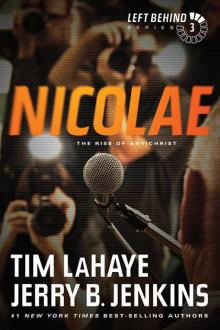 Nicolae: The Rise of Antichrist
Nicolae: The Rise of Antichrist Desecration: Antichrist Takes the Throne
Desecration: Antichrist Takes the Throne Mark's Story: The Gospel According to Peter
Mark's Story: The Gospel According to Peter Babylon Rising
Babylon Rising Thunder of Heaven: A Joshua Jordan Novel
Thunder of Heaven: A Joshua Jordan Novel The Edge of Darkness
The Edge of Darkness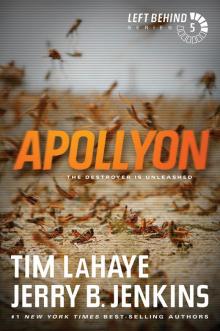 Apollyon: The Destroyer Is Unleashed
Apollyon: The Destroyer Is Unleashed Armageddon: The Cosmic Battle of the Ages
Armageddon: The Cosmic Battle of the Ages Soul Harvest: The World Takes Sides
Soul Harvest: The World Takes Sides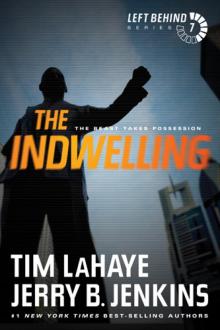 The Indwelling: The Beast Takes Possession
The Indwelling: The Beast Takes Possession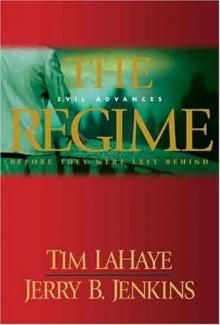 The Regime: Evil Advances
The Regime: Evil Advances The Rapture: In the Twinkling of an Eye / Countdown to the Earth's Last Days
The Rapture: In the Twinkling of an Eye / Countdown to the Earth's Last Days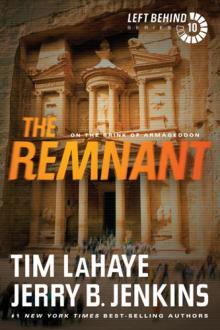 The Remnant: On the Brink of Armageddon
The Remnant: On the Brink of Armageddon John's Story: The Last Eyewitness
John's Story: The Last Eyewitness The Europa Conspiracy
The Europa Conspiracy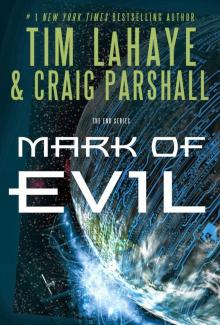 Mark of Evil
Mark of Evil Brink of Chaos
Brink of Chaos The Mark: The Beast Rules the World
The Mark: The Beast Rules the World 04 The Edge of Darkness
04 The Edge of Darkness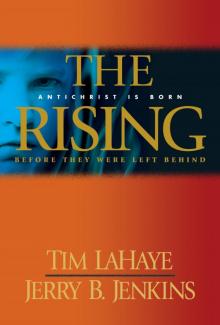 The Rising: Antichrist is Born / Before They Were Left Behind
The Rising: Antichrist is Born / Before They Were Left Behind Babylon Rising: The Edge of Darkness
Babylon Rising: The Edge of Darkness 03 The Europa Conspiracy
03 The Europa Conspiracy Desecration
Desecration Left Behind
Left Behind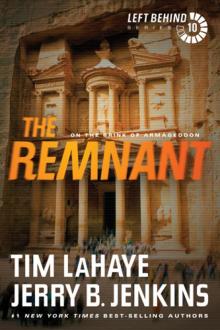 The Remnant
The Remnant Soul Harvest
Soul Harvest Left Behind Book 13: Kingdom Come The Final Victory
Left Behind Book 13: Kingdom Come The Final Victory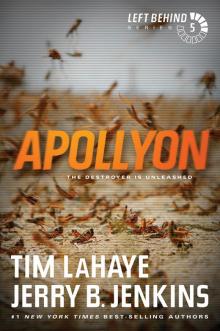 Apollyon
Apollyon 02 Thunder of Heaven: A Joshua Jordan Novel
02 Thunder of Heaven: A Joshua Jordan Novel Glorious Appearing
Glorious Appearing The Rapture: Evil Advances / Before They Were Left Behind
The Rapture: Evil Advances / Before They Were Left Behind Edge of Apocalypse
Edge of Apocalypse Tribulation Force
Tribulation Force The Left Behind Collection: All 12 Books
The Left Behind Collection: All 12 Books Black Friday
Black Friday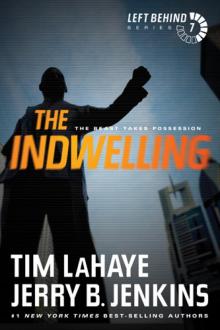 The Indwelling
The Indwelling The Left Behind Collection
The Left Behind Collection